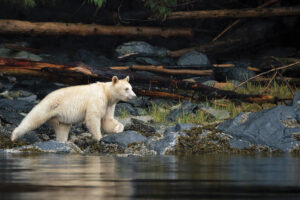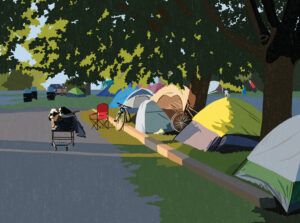
People & Culture
Kahkiihtwaam ee-pee-kiiweehtataahk: Bringing it back home again
The story of how a critically endangered Indigenous language can be saved
- 6310 words
- 26 minutes
This article is over 5 years old and may contain outdated information.
People & Culture

Last week I got to spend a day out with paleontologist Grant Zazula and his two assistants. We spent about 10 hours walking over a creek bed in a gold mine that has yielded extraordinary fossil remains. This is a fully working gold mine, and the owner lets paleontologists explore freely. Grant promised a day filled with finding pre-historic bones, and he was right!
Early on in the morning I found a pre-historic bison horn (about 45 cm long) that Grant estimates is 25-30,000 years old! Later I found the jaw bone of a bison with teeth intact. A couple of the roots were exposed — very cool!
Grant was hoping to find bones from camels, lions or perhaps a simitar cat. Our team also found several long ribs from woolly mammoths. These animals all lived here at the foot of a glacier many tens of thousands of years ago when the land bridge connected Asia to North America.
I’m on the river again, so I’m back to my solitude. With a few weather interruptions, I’ve passed the Forty Mile ghost-town and Eagle, Alaska — both days involved long days of paddling about 80 km each day. Let’s hope the sun shines. While on the Yukon River, I’ve either been surrounded by dark clouds or pelted by rain approximately three quarters of the time. I’m ready for a tan!
Allen Macartney is completing a solo trip on the Yukon River to retrace the route of prospectors in the days of the Klondike gold rush. Read more of his blog posts and learn about his Royal Canadian Geographical Society-funded expedition.
Are you passionate about Canadian geography?
You can support Canadian Geographic in 3 ways:

People & Culture
The story of how a critically endangered Indigenous language can be saved

Wildlife
How ‘maas ol, the spirit bear, connects us to the last glacial maximum of the Pacific Northwest

Places
In Banff National Park, Alberta, as in protected areas across the country, managers find it difficult to balance the desire of people to experience wilderness with an imperative to conserve it

People & Culture
For unhoused residents and those who help them, the pandemic was another wave in a rising tide of challenges